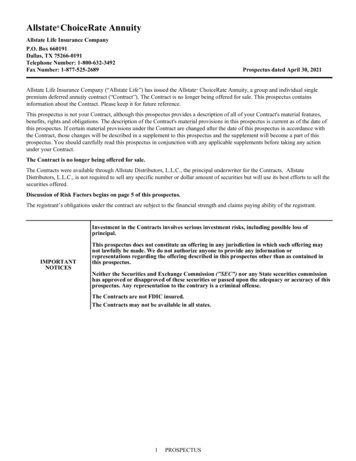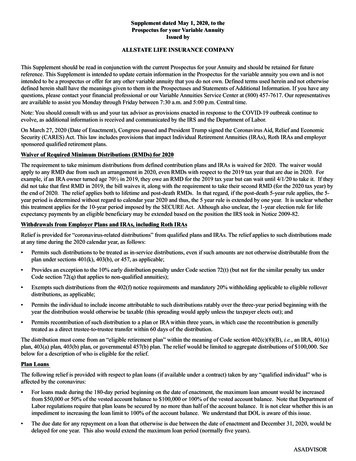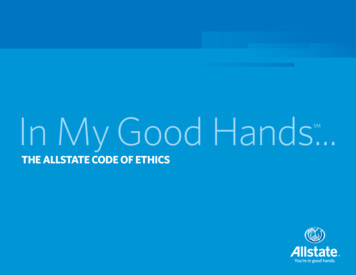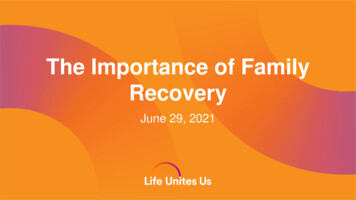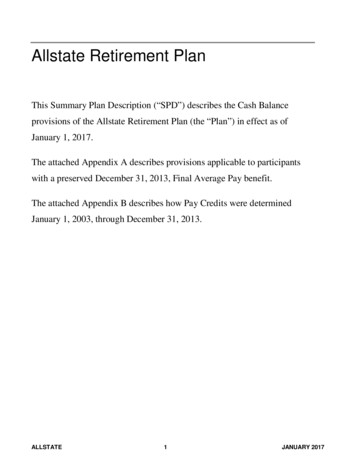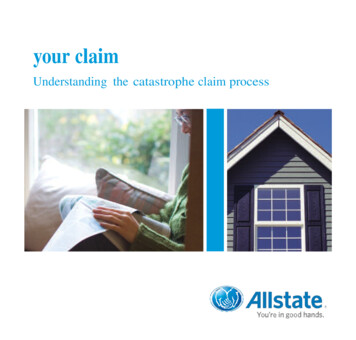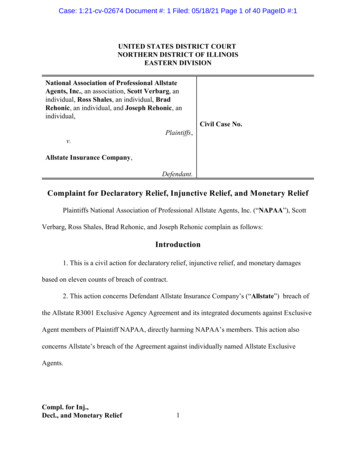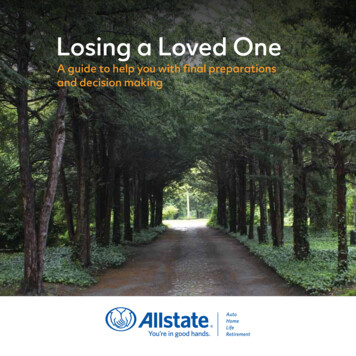
Transcription
Losing a Loved OneA guide to help you with final preparationsand decision making
Our Sincere CondolencesNo one can ever truly be prepared for the death of a loved one – or thenumber of decisions and responsibilities that follow.At Allstate, we are committed to being there for you during this difficult time.We have compiled this guide to help you manage the wide range of decisionsand emotions you will likely experience in the coming months. From funeralarrangements, to practical and financial matters, to grief support. We arehere to help you. Call us if you have any questions.“Only people who are capable of lovingstrongly can also suffer great sorrow,but this same necessity of loving servesto counteract their grief and heals them”.— Leo Tolstoy2
The First Days: Funeral andMemorial ServicesPlanning the funeral and memorial services are among the first priorities you willhave to tend to upon the death of a loved one. You may have already discussedsome of the arrangements beforehand – and that will only help lessen the burdenof decision-making during the first few days of loss. Determinewhat you can afford. Depending on your location, an averagefuneral can cost between 6,000 - 10,000 or more. Ask someone you trust foradvice – and then be firm about what you are willing to pay. This way, you will beable to plan a dignified funeral within your budget. nlist the help of a close friend or family member to help you make funeralEarrangements, including the type and elements of the service(e.g. wake, religious, cremation).Contact the funeral director or memorial society.I f applicable, authorize immediate donation of body parts if the deceasedhas a signed organ donor card.Contact medical school for body bequests, if applicable. rovide an obituary or paid death notice to local papers and any otherPappropriate publications.3
Week One: Family and Household MattersAlthough it is an overwhelming time, don’t neglect family and household matters,especially if you will be away from home. Notify relatives, friends and employers.I dentify and address immediate property matters, such asmortgage, rent and utilities. Retain all incoming mail and sort it out at a later date.This prevents the loss of bills and checks in the potential confusionimmediately following your loss.If you will be away:Arrange for mail pickup and cancel newspaper delivery. ancel appointments and home health services, such asCmeal deliveries, aides or volunteers.Hire a house sitter or put timers on lights and TVs.4
Week One: Legal & Financial ResponsibilitiesContact your attorney or executor (named in the will) as soon as possible to helpexplain the terms of the will and file the will in probate court. You will also want tocontact your accountant or financial professional to begin to address importantfinancial matters, such as changing the name on any jointly held accounts. Obtain certified copies of the deathcertificate (10-15 copies) to use fornotifying state agencies, creditors,banks or other organizations. Notify all insurance companiesincluding life insurance, homemortgage insurance, accidentinsurance, auto loan or other creditinsurance, worker’s compensationand union insurance to review policiesand beneficiaries, if necessary. Theindividual companies will send claimsforms and instructions if there is adeath-related benefit. Locate all important documentsneeded to settle the estate, including:will or living trust; deeds; titles;licenses; insurance policies; financialrecords; tax returns; identificationpapers; disability claims; and militarycertificates. Investigate possible sources ofbenefits through social or fraternalorganizations, unions, mortgagecompanies and credit cards. Notify the deceased’s employer.They can arrange for benefitsdue to the beneficiaries if he orshe participated in any companyinsurance, retirement or pension plans. Contact the U.S. Departmentof Veteran Affairs for benefits,if the deceased was a veteran:800-827-1000. Notify Social Security of death andfile for any death or survivor benefitsthat may apply: 800-772-1213.5
Within The First MonthAfter the funeral and initial consultation with your legal and financial professionals,you should address other important issues. Send the deceased’s medicalclaims to insurance carriers. File a change of beneficiaryform if the deceased was thebeneficiary on your insurancepolicies, retirement accountsand/or investments. Change the billing name withutilities, phone, cable TV, garbagecollection and any other homeservice providers, if applicable. Open a checking account inyour own name if you don’talready have one. Change names on credit cardaccounts if they were jointly held.You may be required to supply eachcard issuer with a copy of the deathcertificate. If all the credit cardswere in the deceased’s name,apply for your own. ontact the state DepartmentCof Motor Vehicles to changevehicle registrations.6
After The First MonthAt this point, you may now be ready to handle longer-term issues withyour legal and financial professionals. e-title any jointly held real estateRor other property, especially if youwish to sell it later. eview old records and files,Rincluding at least 13 monthsof cancelled checks, for anyadditional assets, benefitsor obligations. alk to your insurance agentTabout any changes on home andauto coverage. You may need tore-evaluate your insurance needs. sk your financial professionalAto help prepare a net worthstatement and make a listof income and expenses.I f there is a business, work withyour attorney to determine whatdecisions need to be made aboutthe future of the business. Contactairlines to apply fortransfer of frequent flyer milesto primary beneficiary (unlessotherwise assigned in the will). onsult with your attorney aboutCupdating your own will.7
After The Third Month Compose a monthly budget that you can follow at least until you’ve becomecomfortable with managing the money available to you in your new situation. Consult your accountant or tax advisor about your tax returns and gatherany information the advisor may need.After The Sixth Month Begin planning for your financial future by reviewing your assets and liabilities.Consult with your local Allstate Agency to research changes and investmentsyou may want to make.8
After The First YearDuring the process of grieving the death of a loved one, you are likely to experience aheightened sense of vulnerability. You may be living alone for the first time in a longtime – and not accustomed to managing life and money on your own.To help you maintain a sense of personal and financial security, you may considerwaiting a full year before making any major decisions. According to grief experts,it takes at least a year before you are emotionally prepared to make important,life-altering decisions. Even then, you should approach them with caution andseek professional guidance.These important decisions may include the following:Paying off the mortgageMoving to a new locationMaking new investmentsRemarryingProtect Yourself Against FraudFamilies who have lost a loved one are prime targets for fraud. It is best to turn anyunusual requests over to your executor, attorney or other professional advisor.You may receive:Don’t tell strangers that you are alone: Demands for repayment ofloans that don’t exist Refer to the deceased as “notavailable” rather than “deceased”when someone calls Unsolicited COD merchandise Mark incoming mail with “nolonger at this address.” False overdue notices9
Survivor ResourcesAfter the death of a loved one, it can be reassuring to know that you have peopleand resources you can turn to for assistance and comfort. The following list suggestsseveral resources and guidelines you may not have thought of in your effort tore-establish a feeling of normalcy.Support GroupsGrief support groups are beneficial in helping you to share your feelings with others.These groups provide a safe environment to talk about your grief, often at no charge.When seeking a counselor or grief support group, ask: Your funeral homeYour place of worshipFamily and friendsYour employer’s EmployeeAssistance ProgramMilitary service officesAn excellent national grief support network is the Widowed Persons Service,a nonprofit program of the American Association of Retired Persons (AARP).Widowed Persons Service provides free counseling, grief support and referralsthrough trained widowed volunteers. Contact them at 888-OUR-AARP(888-687-2277) or www.aarp.org.10
Reading MaterialsPublic libraries, religious institutions and grief support groups often havebooks under the topics of death, widowhood or bereavement. Theseresources may also have materials on topics that may be of assistance toyou, such as health, housing, insurance and finance. You can also searchonline using keywords to find the websites, chat forums and other onlineresources that best suit your needs.Your Allstate Agency ishere for you.We are committed to helping you manage the challenges of losing a lovedone. Our team is experienced in dealing with the tough decisions – and thewide range of emotions that go along with them.“Time is a physician that heals grief.”— Diphilus11
2016 Allstate Insurance Company. allstate.comALR5016 1/16
insurance, retirement or pension plans. Notify Social Security of death and file for any death or survivor benefits that may apply: 800-772-1213. Notify all insurance companies including life insurance, home mortgage insurance, accident insurance, auto loan or other credit insurance, worker's compensation and union insurance to review policies
